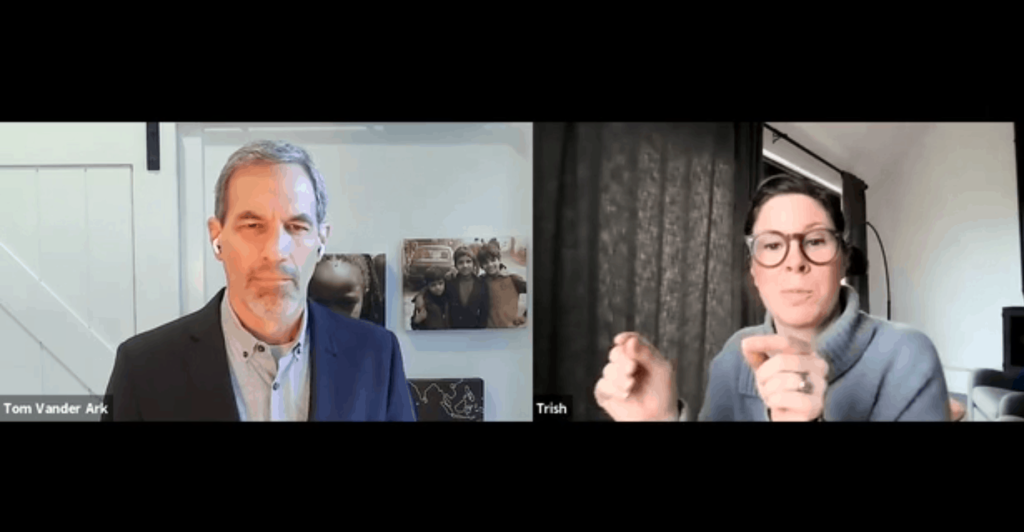Dr. Trish Scanlon on How Voice Technologies Should Work For Kids

On this episode of the Getting Smart Podcast Tom sits down with Dr. Trish Scanlon, CEO and founder of Soapbox Labs.
Dr. Scanlon is one of the foremost leaders on voice technologies, especially with regards to children’s voices. She has over 20 years of experience working in speech recognition technology, including at Bell Labs and IBM. In 2018 Dr. Scanlon was named one of Forbes “Top 50 Women in Tech” globally. In 2020, she was ranked 6th of 17 global “Visionaries in Voice” by industry leading publication Voicebot.ai.
Let’s listen in as Tom and Dr. Scanlon discuss the possibilities of voice technologies, why Dublin is a hotbed for innovation, why children pose a unique challenge in the field and how tech can be keeping ethics and wellbeing at the center.
Dr. Trish Scanlon always wanted to be an inventor. She went to study electrical engineering to make this dream a reality and along the way discovered the promise of natural language processing and voice technologies. This, coupled with observing her children, helped her to see a massive opportunity in the field of voice technologies — children’s voices. Kids have a vastly different behavior, vocal anatomy and language. They also are “voice native” being the first to be raised among voice assistants. Often times they will talk to things, expecting them to work.
To meet this opportunity, Dr. Scanlon launched Soapbox Labs, a research and development lab that creates voice technologies for kids and licenses the tech to other edtech companies. She says that some of the key applications of voice technologies are toys, speech therapies, formative feedback to both child and parent, dyslexia screening and vocabulary.“If built correctly, AI has the potential to build objective assessment. It has to be done thoughtfully, not just rushing things into the classroom,” she said.
On the subject of accents, she discussed the need for massive data collection because “We can’t penalize for accents, it’s also equally important that we don’t drop the bar.” To assess their own anti-bias performance, Soapbox Labs has been working with Florida Center for Reading Research on their Reach Every Reader Project. When assessed for bias, they detected no bias in the Soapbox technology.
She also spoke at length regarding ethics, privacy and transparency, citing the latter as the primary obstacle. In the meantime, she says that all teachers and students should be aware of the positives and negatives of
To keep learning she recommends that you “love what you do and do what you love.”
Key Takeaways:
[:08] About today’s episode.
[:54] Tom welcomes Dr. Scanlon to the podcast.
[1:12] How did Dr. Scanlon become interested in voice technology?
[2:32] Was Dr. Scanlon able to find advisors 20 years ago in voice technology?
[3:50] Which machine learning tools are most useful in speech recognition?
[5:24] When did Dr. Scanlon recognize that speech recognition was particularly challenging for children?
[8:20] The origin story of Dr. Scanlon’s company, SoapBox Labs.
[10:35] Dr. Scanlon explains the service that SoapBox Labs offers its clients.
[12:37] About the Turnaround for Children Toolbox.
[13:17] The current and planned applications for voice recognition, speech therapy, and voice tech in learning and development in the classroom.
[15:53] How they manage varying accents in speech technology.
[19:06] Discussing the challenges around the biases in voice recognition technology.
[21:45] Other categories of assisted tech that Dr. Scanlon is excited about with regards to how they can better serve and create more access for learners with differences.
[23:53] Is the next generation growing up as voice technology natives? How should we be managing or navigating this next generation of youth growing up as voice natives?
[27:04] What Dr. Scanlon thinks students and teachers should know about machine learning today, as well as how and where we should be introducing this topic in school.
[28:53] Why is Dublin a hot spot for ed-tech startups? Why have they become a world leader in technology?
[31:13] How does Dr. Scanlon continue her learning?
[32:26] Tom thanks Dr. Scanlon for joining the podcast.
Mentioned in This Episode:
- SoapBox Labs
- Dr. Trish Scanlon
- Voicebot.ai
- Toolbox | Turnaround for Children
- TechCrunch
- EdSurge
- Getting Smart Podcast Ep. 258: “Flynn Coleman on a Human Algorithm”
Stay in-the-know with innovations in learning by signing up for the weekly Smart Update.




0 Comments
Leave a Comment
Your email address will not be published. All fields are required.